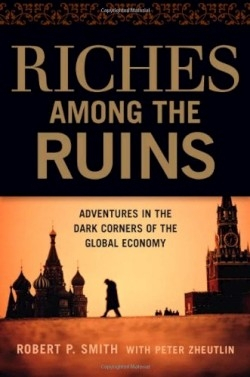Riches Among the Ruins
Adventures in the Dark Corners of the Global Economy
Smith spent a long, stressful career buying and trading government debts in emerging nations. This “financial Indiana Jones,” as he was called by Forbes magazine, received death threats, placed his own life in jeopardy by trading in countries with repressive governments run by violent dictators, and loved every challenge. This memoir describes his adventures in such international cauldrons as El Salvador, Turkey, Guatemala, Panama, Nigeria, Russia, and Iraq.
Smith is the founder and managing director of the Turan Corporation, which trades in emerging markets, and is regarded as an authority on the debt of the developing world. As a young man with wanderlust he did not want to join his father’s law firm, although he is a graduate of Bowdoin College and Boston University’s Law School. To escape, Smith went to Vietnam in 1968 as a financial officer for the U.S. Agency for International Development (USAID). There he learned one of his most valuable lessons: successful business depends on knowing and respecting your clients.
To his credit, the author explains patiently the intricacies of bond trading: the buying of government debts and then selling them at a higher cost to third parties brave enough to believe the debts will be paid. During the 1980s, Smith earned $300—$400 million and the nickname, “King of the Jungle Bonds,” in war-torn Nigeria, by facilitating trading with Indian holders of Nigerian bonds.
Smith’s most exciting and nerve-wracking venture was his debt-trading in Russia during the 1990s, when Russia made the arduous transition from communism to capitalism. Organized crime and political assassinations had eroded government stability to a level that the author calls, “the perfect conditions to do business.” In one day, Smith’s Russian holdings plummeted in value from $20 million to $5 million—a staggering loss which the author was able to more than recoup as the country be-came politically stable and oil prices rose.
Although the author does not envision the United States becoming a second- or third-world country, he offers some disturbing observations about a national decline caused primarily by the widening income gap between the rich and the poor. This crackling good yarn about a high roller in the age of globalism will appeal to financial specialists and to general readers—a good choice for public libraries.
Reviewed by
Karl Helicher
Disclosure: This article is not an endorsement, but a review. The publisher of this book provided free copies of the book to have their book reviewed by a professional reviewer. No fee was paid by the publisher for this review. Foreword Reviews only recommends books that we love. Foreword Magazine, Inc. is disclosing this in accordance with the Federal Trade Commission’s 16 CFR, Part 255.

